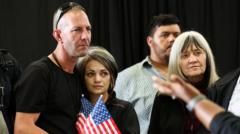The arrival of 59 white South Africans in the US under an expedited refugee plan has sparked controversy, with critics accusing the Trump administration of racial favoritism and undermining the legitimacy of refugee status.
Controversial Refugee Policy: White South Africans Arrive in the US Amid Criticism

Controversial Refugee Policy: White South Africans Arrive in the US Amid Criticism
A group of white South Africans has been granted expedited refugee status in the US, leading to significant backlash and debate over racial biases in US immigration policy.
A new chapter in US immigration policy has unfolded as a group of 59 white South Africans arrived at Dulles Airport, receiving refugee status under a plan expedited by then-President Donald Trump. The rationale for this decision hinges on claims of "racial discrimination" faced by the Afrikaner minority in South Africa.
The South African government quickly pushed back against this narrative, asserting that there was no valid persecution occurring that could justify such refugee applications. Human Rights Watch criticized the action as a discriminatory move that has effectively denied asylum to thousands of non-white refugees, predominantly from conflict-ridden areas, including Afghanistan.
Upon their arrival, the South African group was welcomed by U.S. officials, marking a stark contrast to the usual lengthy refugee processing timeline. As these individuals—many accompanied by children—waved American flags in a festive arrival area, questions arose regarding why their applications were prioritized over others. Trump cited a purported "genocide" against white farmers in South Africa, claiming that the race of victims was inconsequential, though his assertions were met with rebuttals.
South African President Cyril Ramaphosa rebuffed Trump's claims during a phone conversation, clarifying that true refugees are forced to flee their homeland due to genuine fears of persecution. He maintained that the Afrikaners do not meet this criteria. U.S. Deputy Secretary of State Christopher Landau echoed this sentiment, suggesting it was unsurprising for a country to deny the refugee status of its citizens.
The issue of land reform in South Africa adds another layer to this contentious debate, where a significant gap remains between the population's demographics and land ownership post-apartheid. Although the government has enacted laws allowing for land seizures without compensation, officials state that no such actions have been realized as of late.
Critics of the refugee policy have emerged from both sides of the political spectrum, labeling it as a racially charged maneuver. The Episcopal Church disclosed that it would discontinue collaboration with the federal government on refugee resettlement due to the preferential treatment given to the Afrikaners. Meanwhile, voices like Gregory Meeks have condemned the policy as a political distortion rather than an ethical refugee assistance program.
In this multilateral conflict, figures like Elon Musk have compounded the rhetoric by supporting claims of a white genocide in South Africa, which have been largely debunked. The juxtaposition of this new refugee policy against the backdrop of Trump's broader clampdown on asylum seekers has only intensified the debate, leading to strained US-South Africa relations.
The arrival of these white South Africans in the US has opened old wounds around race and immigration, raising fundamental questions about how refugee status is awarded and the narratives that shape such decisions in a polarized political climate.






















